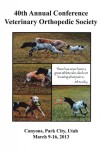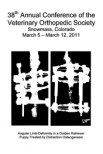ABSTRACT
Objective—To investigate mutations of the TP53 gene in canine osteosarcoma (OS).
Study Design—Clinical historic cohort study.
Animals—Client-owned dogs.
Methods—OS (n=59) were screened for mutations of the complete TP53 gene using polymerase chain reaction and the mutation was analyzed by single-strand conformational polymorphism. Clinical outcome of dogs with TP53-mutated OS were compared with dogs with OS without a mutation after complete surgical excision of the primary tumor.
Results—TP53 gene mutations were observed in 24 of 59 (40.7%) OS; 3 mutated OS had 2 mutations. The alterations consisted mainly of point mutations (74%). Dogs with mutated OS had a significantly shorter survival time (ST) after surgery than dogs with normal tumor TP53 gene expression (P=.03). Other significant prognosticators for ST and disease-free interval included elevated serum alkaline phosphatase (P<.01) and tumor grade (P=.01).
Conclusion—TP53 genetic mutations are common in canine OS and may have a prognostic value.
Clinical Relevance—Mutations of the TP53 gene may influence survival and should be considered when evaluating canine OS.
TP53 Gene Mutations in Canine Osteosarcoma
Date
2008
Journal
Vet Surg
Volume
37
Number
6
Pages
454-60









